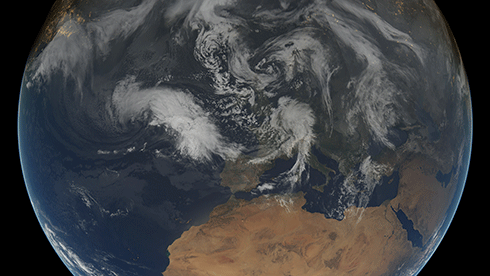
|
Published: 22 December 2014
Data show 2014 has been Europe’s hottest year on record
Separate analyses of available data by researchers from Europe and Australia has found that human-induced climate change played a significant role in making 2014 Europe’s hottest year on record.

|
|
Nineteen European countries are set to mark 2014 as their hottest year on record. Credit:
NASA Goddard Space Flight Centre under CC BY 2.0 licence
|
Scientists from the University of Melbourne and Australian National University joined with colleagues from the University of Oxford and the Royal Netherlands Meteorological Institute (KNMI) to conduct independent assessments of climate data, using different approaches involving statistical analyses of the historical temperature record and the results of thousands of simulations with state-of-the-art climate models.
‘It is clear that human influences on climate have been the dominant factor in breaking of the previous record temperature averaged across Europe,’ said Professor David Karoly, Research Director at the University of Melbourne’s European Union Centre on Shared Complex Challenges.
‘This is further evidence that climate change is affecting all regions and an indication that urgent action from all national governments is needed to slow global warming by reducing greenhouse gasses.’
The Melbourne team utilised hundreds of climate model simulations from the Coupled Model Intercomparison Project phase 5 (CMIP5). They found that the odds of temperatures across Europe reaching these levels were increased by at least 35 times due to human influences on our climate.
‘By comparing climate model simulations representing the world as it is with simulations of a world without humans, we show that the risk of record hot years like 2014 occurring has very likely increased by at least 35-fold,’ said Andrew King, a climate scientist from the University of Melbourne who conducted the analysis.
The Dutch team used long records of observed temperatures across Europe and estimated that the chances of a very hot year like 2014 over Europe has been increased at least 80 times by the human influences on climate.
Using a large computing network, weather@home), Oxford scientists simulated Europe’s weather based on observed global ocean temperatures. At the same time, they simulated what 2014 would have been like if there were no human-influenced climate change.
Comparing those two ‘worlds’ they found that the 2014 European temperatures were much more likely in the simulated world with climate change than the one without.
Nineteen European countries are very likely to see 2014 as their hottest year on record: Austria, Belgium, Croatia, Czech Republic, Denmark, France, Germany, Hungary, Iceland, Italy, Luxembourg, The Netherlands, Norway, Poland, Serbia, Slovakia, Slovenia, Sweden (equal to 1953) and the United Kingdom.
Source: University of Melbourne
Just for fun! Researchers may have the results in from their sophisticated analyses, but ‘ordinary guy’ Roy gets straight to the point on human-induced climate change.
Credit: Climate Council



